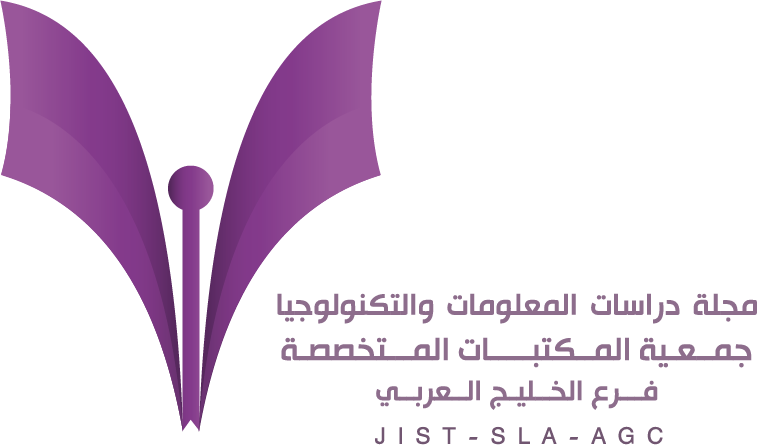-
oa جهود مؤسسات المعلومات في سلطنة عمان في إتاحة المعلومات للجميع بما يخدم تحقيق أهداف التنمية المستدامة2030
- Source: Journal of Information Studies & Technology (JIS&T), Volume 2021, Issue 1, Mar 2021, 2
-
- 12 July 2020
- 27 August 2021
- 31 March 2021
Abstract
ملخص
هدفت الدراسة إلى التعرف على جهود مؤسسات المعلومات في سلطنة عمان في إتاحة المعلومات وتمكين الوصول إليها من قبل الجميع بما يخدم تحقيق أهداف التنمية المستدامة 2030، معتمدة في ذلك على المنهج النوعي متمثلًا في استمارة الأنشطة والمقابلة شبة المقننة مع إدارات مؤسسات المعلومات في سلطنة عمان. وقد توصلت الدراسة إلى العديد من النتائج أهمها: وجود أربع فئات لإتاحة المعلومات للجميع تقع خارج الإطار المتعارف عليه للإتاحة والمتمثل في إتاحة مصادر المعلومات داخل مؤسسات المعلومات وهي: الإتاحة بعدة لغات، والإتاحة لذوي الفئات الخاصة، والإتاحة عن طريق التدريب والتدريس، وأخيرًا الإتاحة عن طريق الوصول الكامل إلى المعلومات. كما أوضحت النتائج أن جميع مؤسسات المعلومات عينة الدراسة تتبنى عدة أشكال لإتاحة المعلومات للجميع باستثناء مركز منح الثقافي والذي لايزال يعتمد على الإتاحة عن طريق توفير مصادر المعلومات داخل مكتبة المركز، كما تبين حصول فئة الإتاحة «الوصول الكامل إلى المعلومات» على أكبر عدد من أشكال الإتاحة (27 شكلًا)، تلتها مباشرة «الإتاحة لذوي الفئات الخاصة» (12 شكل)، ثم «الإتاحة عن طريق التدريب والتدريس» (5 أشكال)، وأخيرًا «الإتاحة بعدة لغات» (4 أشكال). وقد أوصت الدراسة بتعزيز ثقافة الوعي المعلوماتي ومهارات الوصول إلى مصادر المعلومات وكفاءة استخدامها لضمان حق الجميع في الوصول إلى المعلومات بما يكفل تلبية احتياجاتهم منها، وببناء وتفعيل تعاون مشترك بين مؤسسات المعلومات والجهات المعنية بذوي الإعاقة من أجل تعزيز حقهم في الوصول إلى المعلومات، وإيجاد آليات فاعلة لزيادة قدرتهم على الوصول إلى مصادر المعلومات، والاستفادة من تجارب الدول في هذا الجانب. ويؤمل أن تساهم الدراسة في تسليط الضوء على إدارات مؤسسات المعلومات للمساهمة بشكل أفضل في تحقيق أهداف الأمم المتحدة للتنمية المستدامة 2030 في سلطنة عمان.
Aim: This study aims to identify the Omani information-institutions efforts to enable information accessibility and, by doingso, how they are contributing to achieving Oman Sustainable Development Goals 2030. Methodology: The researchers employed the qualitative approach using varied tools such as an activities form and semi-structured interviews with the information-institutions management (n=11). Results: It was found that there are four methods for making information accessible to all, apart from the usual methods, 1) making certain types of information accessible in multiple languages, 2) making information accessible to persons with special needs, 3) making information accessible through training and teaching and 4) making information available by offering %100 accessibility to information. The study also revealed that all the institutions examined use varied methods to make information accessible to all except for Manah Cultural Centre which mainly provides information accessibility through its library. The results also showed that full access to information is the most common access method (27 forms) followed by providing information access to persons with special needsonly (12 forms), then providing access through training and teaching (5 forms) and finally accessibility to heritage-related information in multiple languages (4 forms). Recommendations: promoting the culture of information awareness, developing information literacy skills and efficiency, and introducing effective cooperation practices between information institutions and the organizations supporting persons with special needs to improve the information access of this group. The study suggests benefiting from the experiences of other countries in this aspect. Conclusion: It is hoped that the study would help to fill a gap in this area and shed light toinformation-institutions managementto contribute better towards achieving the Sustainable Development Goals 2030 of Oman.


